
JHart: “I’m still fighting to get into rooms, still fighting to be heard, to get the single.”
The British songwriter’s ‘Hitmakers’ journey spotlights songwriting camps, industry politics, and why visibility matters in the fight for creative recognition
JHart (James “Hart” Abrahart) is a Los-Angeles based songwriter and artist who has written with some of pop’s biggest names, including Justin Bieber, Troye Sivan, and Charlie Puth. With over 15 years of experience and a collaborative approach to songwriting, JHart was a natural choice as one of the featured writers on Netflix’s reality series Hitmakers. The show, which is available now, follows select songwriters as they navigate high-pressure songwriting camps, working in groups to write potential hits for top artists like Shaboozey and Usher.
JHart’s journey on Hitmakers may have started later than some, after missing the first songwriting camp in the Bahamas, but he quickly became one of the show’s central figures. His time on the series was full of relatable creative highs and lows, including a tense conversation over splits with a fellow writer on Can’t Relate, a song originally intended for Usher (which JHart recently released under his own artist project). In our interview, JHart opens up about how he joined the show, how songwriting camps have evolved before and after COVID, the industry conversations the series has sparked, and even shares some behind-the-scenes stories that didn’t make the Netflix cut…
Read our 2015 interview with JHart
How you were selected to go on Hitmakers?
“I originally screen tested for an earlier iteration of this show in, I want to say, 2017. I remember that because I didn’t have a beard at the time. At this point, [producer] Harvey Mason wasn’t involved, and a few of us in my friend group all screen tested together, and then it kind of disappeared. I knew there was a sizzle reel up at one point floating around, but I hadn’t heard anything for a few years.
“Then, during the pandemic, they reached out again and said Harvey Mason was involved. They wanted to turn this into an actual thing and asked if I wanted to screen test again. So I screen tested for a second time in 2021 and then I think it got greenlit by Netflix in 2023. And we just started shooting last year.”
You joined a bit later in the show and you missed the Bahamas songwriting session. Was there a reason behind that? Or was that just conflict?
“I would imagine there was no practical scheduling reason for it. I think it was more that they wanted some plot points happening during the show – a ‘bombshell has entered the villa’ moment. That would be my guess.
“But I was happy to join late, because that way I got all the tea on the first camp and knew what I was walking into. I’m friends with a lot of the other writers, so I was like, ‘Y’all just let me know how it goes and if I need to come down with a mystery illness before camp number two.’”
The show gave a view of the different stages of a songwriter’s career, including Trey [Campbell] who opened up about still driving for Uber. At the time of the camp, where did you see your career?
“It was definitely important for us to highlight the career trajectories and arcs of different people. The show is called Hitmakers, so it’s centred around people who have had success. But I also thought, for instance, Trey’s storyline was really compelling. I loved that he was able to be so vulnerable about his own financial struggles while still driving for Uber and pushing forward.
“After 15 years, I still feel like I haven’t had my magnum opus moment. I’m still fighting to get into rooms, still fighting to be heard, to get the single, and there are certain projects that are very specific that I’m still fighting to be a part of. So, it’s interesting: even after all this time, I still feel like I’m fighting to have a seat, a voice, and to be heard. You’re only as good as your last big song. That’s always how it works in the music industry.”
When you say you’re only as big as your last song, how long do you think that power lasts?
“That’s a tough question, because I do think if you are well known enough that people are familiar with your body of work, it counts for something. But I definitely think it’s just such a fast-moving industry. People are always on to the next thing, and there’s always someone coming up who has a lot of buzz. I try to stay tapped in as well as I can, knowing what’s happening, being out and amongst people, and just knowing people. I think that helps.
“For me, my strategy – well, more of an organic approach – has always been to be at the centre of a community and to be friends, to have my community feel strong. Because when your friends are really strong, they can fight for you as well. That’s always been my way of getting through the gatekeepers and all that.”
Aside from having Netflix behind it, how would you compare this experience to your past experiences at songwriting camps?
“It’s interesting because I’ve described this experience as what songwriting camps were like pre-COVID. Pre-COVID, there was definitely less fear around spending money on songwriting camps and things like that. I think back to some of my earlier camps when I first started going — I went to a 17th-century castle in France and got to write for a week. It’s actually where I made some of my best friends that I’m still close with today, like Sarah Hudson, Jesse Saint John, and Jason Evigan. I became really close with them at that exact camp.
“In that regard, the show isn’t too far off. Obviously, it’s glamorised, with a sort of Netflix sheen over the whole thing, but I’ve been to camps before that aren’t too different from some of the things that happened on the show. It’s just less common today. After COVID, a lot of that changed.
“Now, it feels like a lot of people will put on their own camps local to LA, or go to Palm Springs or Santa Barbara, get an Airbnb, and run a camp themselves. Sometimes labels will organise camps like that. There are still camps where people will go to the Bahamas or Jamaica and write for a week with an artist – it just doesn’t happen as often.”

JHart: “There’s a clear separation between people like us and big performing artists who also have touring income and other revenue streams.”
So you’re saying that, unlike in the show, it’s less common for people from different cities and genres to mix at camps?
“It’s more localised now. It definitely feels more cliquey. Post-COVID, a lot of stuff changed – everyone has their groups they work with, and it’s less common for people to bring together a bunch of different writers who normally haven’t worked together. That, I would say, was more the norm pre-COVID. Some of the first camps I remember going to – which, by the way, were when this show was conceptualised – were during that time. It was what we were doing pretty regularly.
“There were camps like the one in France I mentioned, organised by Greg Wells. He would bring together people from different eras of songwriting – some with massive hits in the ’90s and early 2000s, and some brand-new writers just starting out. Every day, you’d get put into a new room, and every night after dinner, you’d play your songs at this big table with everyone. That experience was very true to some of the camps I’ve been to, and honestly, I love that.
“I love the “not knowing.” There’s something so exciting about it. It feels like speed dating. There’s something thrilling about being in a room and figuring out, is there chemistry or not? I like that the show highlighted that. There’s definitely room on other camps where I’ve been in my head, thinking, ‘Get me out of this room,’ because two people aren’t getting along or they’re fighting to take the lead in the room. That part, I like that they highlighted — that is real.”
In the show, you were the only songwriter who mentioned that you had “studied” Shaboozey in detail before you started writing for him – watching his interviews and learning about his artist profile. How do you prepare for your sessions in general when writing for an artist?
“Well, it kind of depends on who I’m writing with and the setting. If I’m in a situation where I feel really comfortable and I know the people and I know we can deliver, I’ll do less preparation. There’s something about the magic in the room and letting the room dictate the song when I really trust the people I’m writing with.
“But honestly, preparation for me often comes from anxiety. For many years, I used to shut down in rooms, especially ones where I wasn’t comfortable. Shooting this TV show was so nerve-wracking that I knew going in that if I prepared with my therapist and by knowing all the artists we were writing for and what they were going through, I’d have a better shot at showing up and demonstrating my talents.
“I do definitely prepare, especially when writing with an artist. I like to know what’s going on in their life, because you never know to what degree they’ll open up to you. Ideally, you get in a room and they can spill everything happening in their world, but that’s not always the case, depending on their day or how they’re feeling. I like to be well-researched before walking into a room with an artist. I’m really happy they chose to keep that in the edit.”
Speaking of the edit, are there any like parts of the show that were edited out that you wish were shown or highlighted a bit more?
“Definitely. I mean, it’s thirty-minute episodes and six episodes. There’s so much more dynamics and nuance that I wish we had a chance to highlight. Hopefully that will happen if we get a season two, because there’s a lot of depth to each person. It’s just hard to capture when you have ten or twelve people writing every day while we were shooting, off and on for a few months. There’s a lot of stuff they wanted to showcase, keeping it entertaining but also highlighting the process. Obviously, some things fall through the cracks when you condense it to that level.
“For example, there’s a scene where I got to sing. We were out in a bar in Nashville, and they asked if anyone in the cast wanted to sing because there was a live band. I said, ‘I’ll sing,’ and I got up and absolutely killed it. But then there was a whole thing afterwards — they couldn’t clear the song because it was a Journey song, Don’t Stop Believin’. They told me, ‘We can’t keep it in the show.’ I said, ‘Hold on, let me see what I can do.’ So I handwrote a letter to Steve Perry, the lead singer of Journey, explaining how much it meant to me to showcase my vocal talent on the show. I got an email back from his manager saying he cleared it and appreciated the letter.
“Of course, Netflix said, ‘We can’t keep it. The scene’s already been cut.’ So, all that effort didn’t get the scene in the show, but just writing the letter and hearing back from Steve Perry was amazing. He’s one of my heroes, so that moment alone was really special.”
Have you heard any conversations start in the industry because of the show?
“Yeah, there have been a lot of conversations and differing opinions. I’m really happy with the way I showed up on the show, and I’ve gotten a lot of good feedback about my personal presence. It’s tough because you can’t please everybody, and with these types of things, everyone has an opinion.
“Ultimately, I believe it’s a net win. We’re showcasing an ecosystem that many people, based on messages in my DMs, didn’t even know existed before the show. Having that spotlight, awareness and showing that these are human beings with this job, this livelihood, and how they make a living, is really important. There’s a clear separation between people like us and big performing artists who also have touring income and other revenue streams. That awareness is key to fighting for our livelihoods.
“Especially in the age of AI that we’re entering, it’s important to understand the humanity behind these roles and that there are real people doing these jobs for a living. A lot of those fighting against fair pay for creatives count on ignorance, on people not knowing, not connecting a face to the name.”

JHart: “A lot of those fighting against fair pay for creatives count on ignorance, on people not knowing, not connecting a face to the name.”
Netflix made one of the episode teasers focus on your conversation with Ben [Johnson] regarding splits, where you first came up with a song title while in a room with him, but then actually used that title idea later on with different co-writers. Watching the show back, did it change your view on the situation at all?
“No, watching it back did not change my view at all. I wouldn’t say I’m happy that moment happened, because it was definitely very stressful and anxiety-inducing. It was 100 percent real, and it’s just so crazy that all of that was caught on camera because the setup looked so perfect. It almost feels orchestrated, but it wasn’t. It was an organic situation, and it’s also something that happens a lot in creative circles.
“There’s often a grey area over things like concepts. For example, if someone is sitting in a writing room and not really active that day, giving them an equal split is pretty well accepted in some circles. But for someone to just say a title in a room, and someone else to respond, ‘Oh, that’s a good song title,’ that’s more of a grey area.
“So, in a way, I’m happy that that moment happened. It became a teachable moment, and I got to share my ethos on fairness, having those kinds of conversations, and setting an example for young creatives. I wouldn’t say I’m happy it happened, because it was stressful, but on some level, I am glad we had an organic moment to deal with something that really does happen in our business. I’m also happy it happened with Ben, because I’ve known him for so long, and we’re fully water under the bridge now. We’re on very good terms.
“It’s funny because as soon as it happened, I thought, ‘Oh, this is about to be a whole thing. They’re going to make us have a full conversation about this.’ You can’t get anything past the producers — they’re on top of everything. So as soon as Ben said it out loud, I was like, ‘Here we go.’”
Was there any more context to the situation that wasn’t shown or highlighted?
“It was like weeks in between filming. It was literally a ten-second moment that happened in Nashville, and then weeks later we were filming in Cabo. I had completely forgotten that moment had even happened.
“The interesting thing about Can’t Relate, is that it was actually our second song of the day and they didn’t include the first song in the edit. We had an hour-and-a-half left before we had to play our songs, and we were like, ‘Let’s do a Hail Mary.’ That’s how Can’t Relate came about. I was literally just scrolling through my phone, saw the title and said, ‘Oh, you know, what about Can’t Relate?’ And then we wrote it. I had completely forgotten that we’d even had that conversation back in Nashville.”
Speaking of the song, you released it under your own artist project despite it originally being written to pitch for Usher. Can you give us a little overview of the song’s pitching process and then why you decided to release it yourself?
“Obviously, I love Usher. I grew up in Atlanta so I have a lot of love for the Atlanta music scene and Usher specifically was one of my heroes growing up. I went to the Confessions tour and was a full-on fangirl. I even put my demo in his mailbox when I was 16 in high school and never got a call, but then I got to work with him on his last album. So, I loved that we were writing for Usher.
“I’d say there are definitely elements of his influence in my music, especially in terms of my vocal style, so it wasn’t a huge stretch to take something we originally wrote for him and turn it into something that would work for me. And honestly, I just loved the song. I thought it was so catchy, and I knew I had to put it out.
“There’s such a tight turnaround schedule with the show. Typically, songs can take years from the moment I write them to when they’re released—sometimes two, three, even five years. But in this case, we wrapped filming in February, and the show came out just a few weeks ago. So, it was a much shorter window and the song hadn’t gotten cut. I knew there was a plot point around it, and it gave me something I could really talk about, so I decided to release it.”
Listening to all the songs from the show again, do you have a favourite from the camp?
“I’m definitely gonna say Can’t Relate. I just love that song. It’s so catchy—I listen to it all the time. Love all my music, but that one just really hits me. And I’d say Tarantino is up there too.”
Now that this camp is over, if you could choose a songwriter to have in the room with you tomorrow, who would you pick?
“I’ve never written with Diane Warren and I would absolutely love to just be in a room with her and watch her process. She’s such a character. She famously doesn’t co-write, so I’m going to give a sort of trick answer: I would co-write with her, just to see how she works. She’s quirky – if you’ve seen her interviews, you know what I mean – but in the best way.
“Honestly, just being a fly on the wall for a day in her world would be incredible. That’s straight up bucket list material. Of course, I also love writing with people I already work with like Sarah Hudson, my writer Alma, and FINNEAS. But if I have to pick one for the dream experience, it’s Diane. Those others are my runner-ups.”
Are there any rising songwriters you are keeping an eye on?
“Even if Alma wasn’t signed to me, I would still work with her, because she’s amazing. There are definitely others I’m loving right now. There’s this guy Liam (Howe). He’s a producer and writer, and does a lot of work with Adele. Jay Bach, who’s also a fellow gay and amazing. Then, thinking of newer or breakthrough people… Zhone comes to mind. I wouldn’t say he’s super new, but he’s having a huge moment right now with Demi and Kesha. He’s phenomenal. He just **gets it and knows how to make a song feel like a hit.”


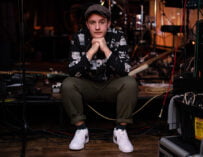


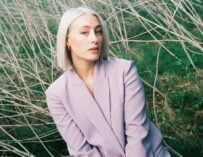
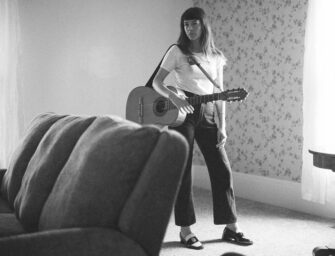
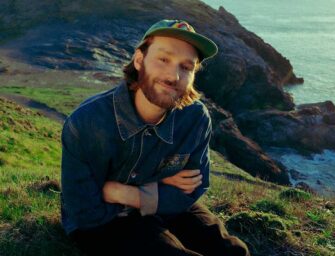
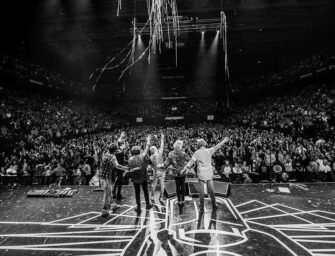

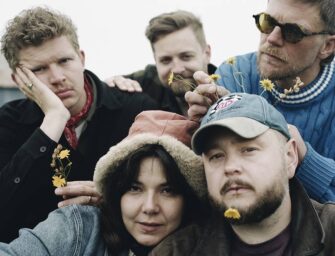























Related Articles